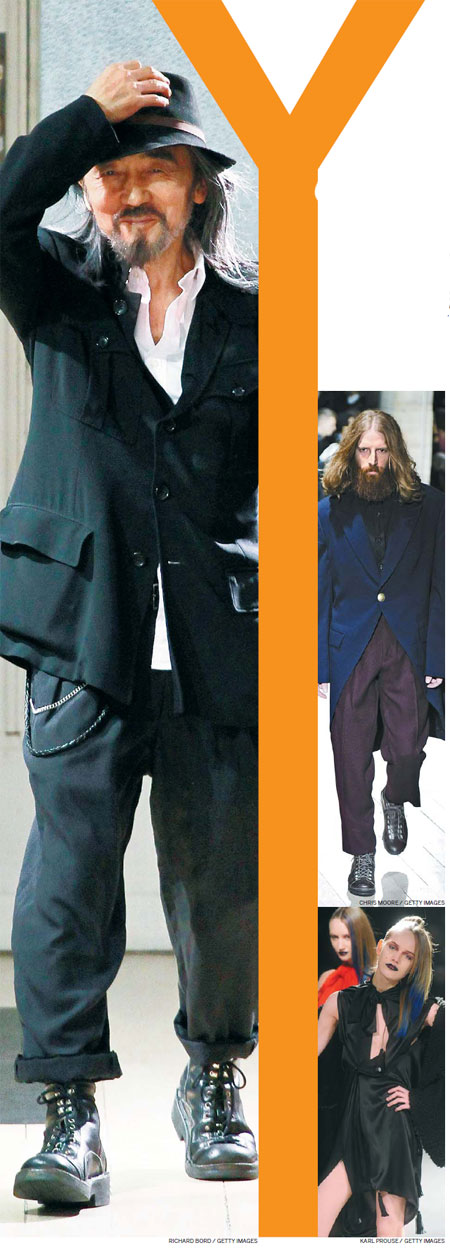Yamamoto rebels against luxury
Updated: 2012-04-05 09:26
By Gan Tian (China Daily)
|
|||||||||||

The fabled Japanese designer is still sticking to his principles at the age of 69, and promoting 'subtraction' and 'pauperism', he tells Gan Tian.
Yohji Yamamoto is a man of many designs but few words, according to fashion maven Suzy Menkes. That was certainly true when he recently gave a speech at China Fashion Forum in Beijing, which he started with a 10-minute video clip without even a welcoming word.
In the clip, Yamamoto's fashion shows were presented, featuring minimal music, fat and old models, and poorly dressed hippies singing casually on the catwalk.
The 69-year-old says his fans understand his "rebellious design language" through these shows.
"I don't like beautiful models doing the regular catwalk. I like them to be fat, old and unusual," Yamamoto says. "They can tremble or even fall on the runway. It is a communication between fashion and people on the scene. These ideas often excite me, like drugs."
It was the first time for Yamamoto to appear in public and give a speech in China. Dressed in a long, multilayered robe from his own label, he spent 30 minutes talking about his values, work and life.
The gray-haired designer has been active in the world's fashion industry for nearly 40 years, but few people know he originally intended to be a lawyer.
Yamamoto graduated with a law degree from Keio University. But in the 1960s, one of his mother's friends needed help at her dress store, and Yamamoto assisted her. This experience helped him make up his mind to attend Bunka Fashion College, in 1966. After graduation in the early 1970s, he started his first line, Y's.
It was his avant-garde approach to fashion that made him stand out, as he created a vigorous, elegant and unique style.
He admits his mother deeply influenced him, as she raised him on her own in a strict manner.
"When a beautiful woman came close, I could not watch her, because of my mother's accusing eyes," he recalls. "I couldn't help but turn around at the women, though, when she had turned away. That's why I always create women's garments with beautiful silhouettes from the back."
In 1981, he opened his first boutique store and held his first fashion show in Paris, a first step on the road to becoming influential in Western fashion circles.
He's known for "subtraction", which means he uses black and gray as basic colors, and simplicity is his trademark, known as "pauperism".
Yamamoto says though Chinese designers are not widely recognized at the moment, this will change in the next decade.
He says talented young Chinese designers are not recognized because they lack opportunities and funds to present their creations.
He says the situation is similar to that in Japan, but there, designers stick together and form small groups, so they can present their designs on the world's stages.
"In the field of fashion, Japan cannot survive without China, as we are both Asian countries. We share the same design concepts, which are different from Western designers," he says.
Yamamoto has collaborated with a who's who of fashion and entertainment world names, including Adidas, Hermes, Takeshi Kitano and Sir Elton John.
Even so, he says, he still prefers to keep it simple.
"Sometimes, I think all I need in life is just a student dormitory and a bed. I can work, eat, drink, and do everything in bed," Yamamoto says. "I don't want too many belongings. I need just a small suitcase. If I get tired and bored in one place, I can go somewhere else. That's the perfect life for me."
He recalls that in the 1990s when he was in Japan, his friend George Armani invited him to Milan, adding he would send his private jet. But Yamamoto refused.
"I don't think my life needs such luxurious experiences," Yamamoto says.
Contact the writer at gantian@chinadaily.com.cn.